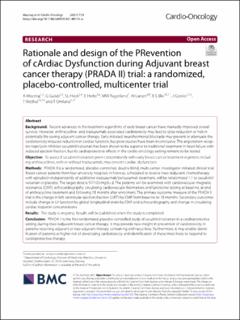Rationale and design of the PRevention of cArdiac Dysfunction during Adjuvant breast cancer therapy (PRADA II) trial: a randomized, placebo-controlled, multicenter trial
Mecinaj, Albulena; Gulati, Geeta; Heck, Siri Lagethon; Holte, Espen; Fagerland, Morten Wang; Larsen, Alf Inge; Blix, Egil Støre; Geisler, Jürgen; Wethal, Torgeir; Omland, Torbjørn
Journal article
Published version

Åpne
Permanent lenke
https://hdl.handle.net/11250/2992341Utgivelsesdato
2021Metadata
Vis full innførselSamlinger
- Department of Clinical Science [2375]
- Registrations from Cristin [10186]
Sammendrag
Background: Recent advances in the treatment algorithms of early breast cancer have markedly improved overall survival. However, anthracycline- and trastuzumab-associated cardiotoxicity may lead to dose-reduction or halt in potentially life-saving adjuvant cancer therapy. Early initiated neurohormonal blockade may prevent or attenuate the cardiotoxicity-induced reduction in cardiac function, but prior studies have been inconclusive. The angiotensin receptor-neprilysin inhibitor sacubitril/valsartan has been shown to be superior to traditional treatment in heart failure with reduced ejection fraction, but its cardioprotective effects in the cardio-oncology setting remains to be tested.
Objective: To assess if sacubitril/valsartan given concomitantly with early breast cancer treatment regimens including anthracyclines, with or without trastuzumab, may prevent cardiac dysfunction.
Methods: PRADA II is a randomized, placebo-controlled, double blind, multi-center, investigator-initiated clinical trial. Breast cancer patients from four university hospitals in Norway, scheduled to receive (neo-)adjuvant chemotherapy with epirubicin independently of additional trastuzumab/pertuzumab treatment, will be randomized 1:1 to sacubitril/valsartan or placebo. The target dose is 97/103 mg b.i.d. The patients will be examined with cardiovascular magnetic resonance (CMR), echocardiography, circulating cardiovascular biomarkers and functional testing at baseline, at end of anthracycline treatment and following 18 months after enrolment. The primary outcome measure of the PRADA II trial is the change in left ventricular ejection fraction (LVEF) by CMR from baseline to 18 months. Secondary outcomes include change in LV function by global longitudinal strain by CMR and echocardiography and change in circulating cardiac troponin concentrations.
Results: The study is ongoing. Results will be published when the study is completed.
Conclusion: PRADA II is the first randomized, placebo-controlled study of sacubitril/valsartan in a cardioprotective setting during (neo-)adjuvant breast cancer therapy. It may provide new insight in prevention of cardiotoxicity in patients receiving adjuvant or neo-adjuvant therapy containing anthracyclines. Furthermore, it may enable identification of patients at higher risk of developing cardiotoxicity and identification of those most likely to respond to cardioprotective therapy.
